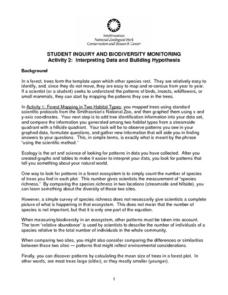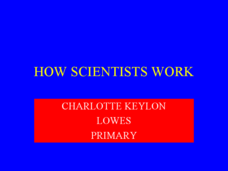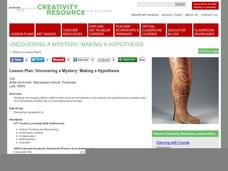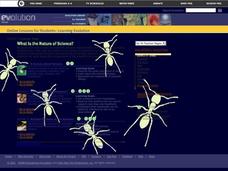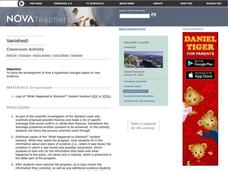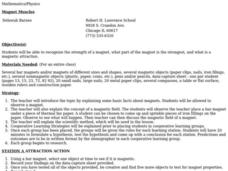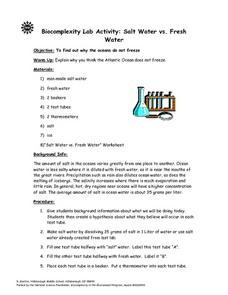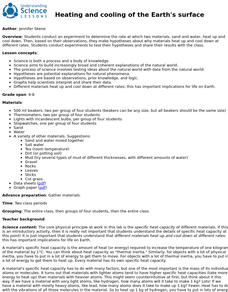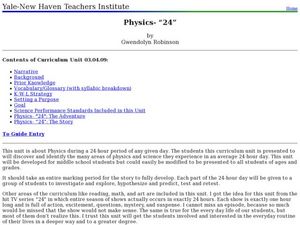Curated OER
Interpreting Data and Building Hypothesis
Students define the term species, and graph species data together with previously collected data at the National Zoo. They interpret graphed data and recognize patterns in the streamside quadrant versus hillside quadrant. Students use...
Curated OER
An Introduction to Microbes and Microbes Are Everywhere
Seventh graders define the term microbe. They identify the five main groups of microbes. Students give examples of ways in which microbes have impacted or currently impact human life. They create a hypotheses for where they expect to...
Curated OER
How Scientists Work
The arsenal of tools a scientist uses to observe the world are varied. This great presentation gives students a look at some of the strategies they should use when looking at the world around them. The information can be used as a...
Curated OER
Lesson: Uncovering a Mystery: Making a Hypothesis
The class is presented with an image of a hand-carved leg. They act as art historians and hypothesize as to the purpose, nature, and creators of this amazing wooden leg. They compose journal entries from the point of view of an art...
Curated OER
BRIDGING THE GENERATION GAP
Students create a hypothesis about the attitudinal differences between generations, test their hypothesis with a survey, chart their findings, and present their answers to the class.
Curated OER
Modeling changes to Ecosystems Part 1
Students record changes in an ecosystem. In this science lesson students make a hypothesis about changes in a terrarium. They record their observations. The students conduct an experiment to test their hypothesis.
Curated OER
The Egg Activity
Students comprehend the three basic steps of science: 1) Observation, 2) Statements of cause and effect (Hypotheses), and 3) Testing. By working with an egg, students are required to observe an object that is very common to them. This...
Curated OER
Types of Marine Debris
Young scholars conduct an experiment. In this marine debris and environment protection lesson, students categorize trash into piles, predict whether these trash items will sink, float or be picked up and carried by the wind and then...
Curated OER
What is the Nature of Science?
Students examine videos of field researach to discover the components of the scientific process. Using forms, they conduct community surveys about the nature of science. They research the extinction of dinosaurs and compare...
Curated OER
Indirect Observation
Students observe obscertainers through indirect observations and make hypotheses about the internal wall structures of the containers. In this indirect observation lesson plan, students make observations of 4 obscertainers with a steel...
Curated OER
Burning It Up
Students explore energy as it relates to body function. Data about the personal physical activity of students is gathered and entered into a database which is utilized to test hypotheses made.
Curated OER
Popcorn Science: Pop Goes the Kernel!
Students conduct various experiments to determine why popcorn pops. They design tests to determine the effect of water in the kernels on its popping. Once the experiments are completed, they write summaries of them proving or...
Curated OER
Vanished!
Students view a video clip about the Stardust crash site. They discover how hypothesis change based on new evidence. They research unsolved plane crashes as well.
Curated OER
Experimenting with Motion
Young scholars design an experiment to change the motion of a rolling marble. In this designing an experiment lesson plan, students form a research question, they develop a hypothesis and they design an experiment using a graphic...
Curated OER
Magnet Muscles
Students experiment with magnetism. In this science lesson plan, students are divided into cooperative learning groups and use the scientific method to test their hypothesis. Each group performs a different experiment.
Curated OER
What Is the Nature of Science?
Students distinguish between scientific and everyday meanings of key words-theory, hypothesis, law, fact-and use in context. They recognize the variables that affect observation, data collection, and interpretation. They discover the...
Curated OER
Salt Water vs. Fresh Water
Students explore why the oceans do not freeze. They explain why they think the Atlantic Ocean does not freeze. Students are given background information about what they are doing. They create a hypothesis about what they believe...
Curated OER
Lesson 2 Its a Small World (Day 2)
Students are able to explain how the water cycle recycles the earth's water supply. They are able to make use of the knowledge of land forms learned in social studies. Students are able to form a hypothesis on how/why the water cycle...
Curated OER
Estimation and Your TV Diet
Students develop estimation skills by using real life situations. In this estimation lesson students collect data about their television watching habits. They make hypothesis about the number of hours they watch, how many commercials,...
University of California
Heating and Cooling of the Earth's Surface
Scholars collect data from heating sand and water before forming testable hypotheses about why sand heats up faster. Afterward, they develop and run experiments to test their hypotheses.
Florida International University
Design Your Own
Apply scientific principles to designing an experiment to study organisms living on the coral reef in our oceans. Through reading, individuals learn about the coral reef ecosystem and important factors that affect its function. Using the...
Statistics Education Web
I Always Feel Like Somebody's Watching Me
Future statisticians and potential psychics first conduct an experiment to collect data on whether a person can tell if someone is staring at them. Statistical methods, such as hypothesis testing, chi-square tests, binomial tests, and...
Curated OER
Physics -- 24
Learners record all of the instances of physics and science they are involved with in a full day. As a class, they complete a KWL chart on physics and read a story about Murphy's Law and the character's experiences. Individually, they...
Alabama Learning Exchange
Plants, Soil and Nutrients
Young scholars conduct an experiment. They review how to use the scientific method to conduct an experiment with white carnations and food coloring. They create a hypothesis and test it to better understand how plants get nutrients,...
Other popular searches
- Scientific Method Hypothesis
- Writing Hypothesis
- Gaia Hypothesis
- Making a Hypothesis
- Writing a Hypothesis
- Hypothesis Writing Labs
- Creating a Hypothesis
- Origin of Life Hypothesis
- Hypothesis Worksheets
- Practice Writing Hypothesis
- Hypothesis Generation
- Gaea Hypothesis


